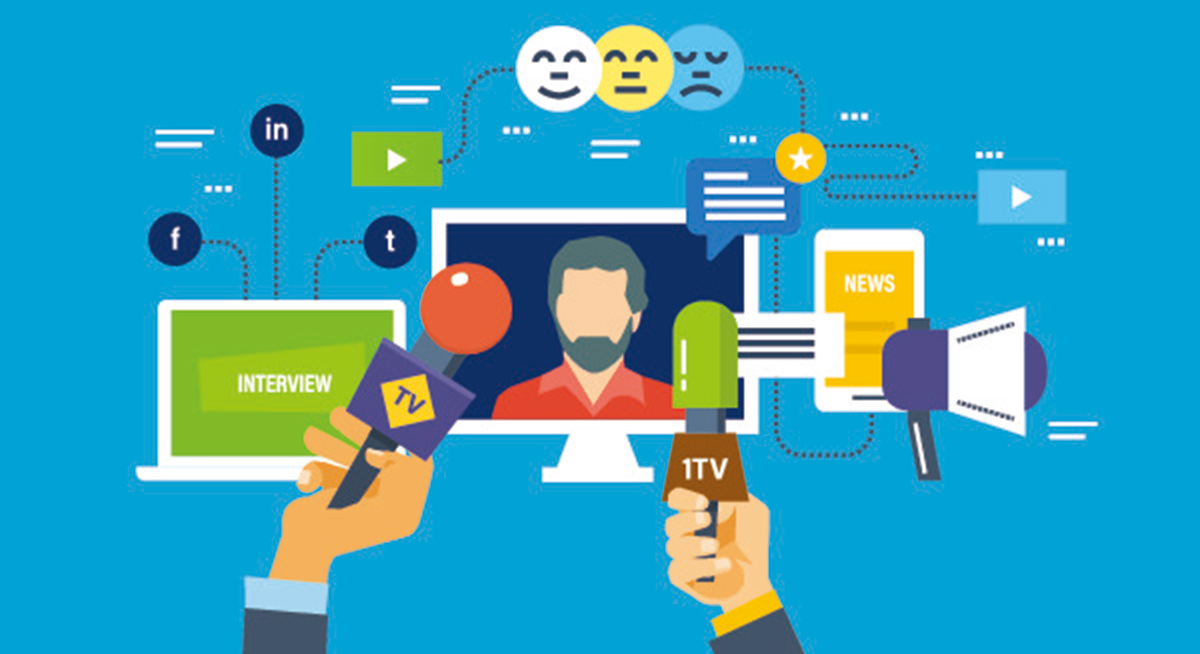Online interviews now a well-established practice with 90% of respondents eager to continue, but face-to-face reporting still holds value
In May 2023, COVID-19 was reclassified as a Class 5 infectious disease under the Infectious Disease Control Law, marking a significant milestone in the post-COVID era. As the pandemic subsides, our daily lives and business activities are gradually returning to normal.
In light of these changes, COSMO PR conducted a second media survey in August 2024, following up on the first media survey in December 2022. This time, the focus was on “media and healthcare companies in a post-COVID era.” Healthcare media professionals were invited to take part in order to understand: 1) what has changed since the previous survey; 2) whether new challenges have emerged; and for the first time, 3) the media’s expectations of pharmaceutical company PR staff and public relations agencies. We received responses from 73 journalists from national newspapers, industry newspapers, and freelancers. In addition to multiple-choice questions, we included a free-response section to capture candid opinions typically not shared.
This newsletter shares a summary of the survey results, including a summary of the free-response opinions. (For details on the survey date and respondents, refer to “Survey Overview” below.)
1. How Information is Communicated
We began by asking respondents the things they don’t like about online seminars (multiple answers allowed).
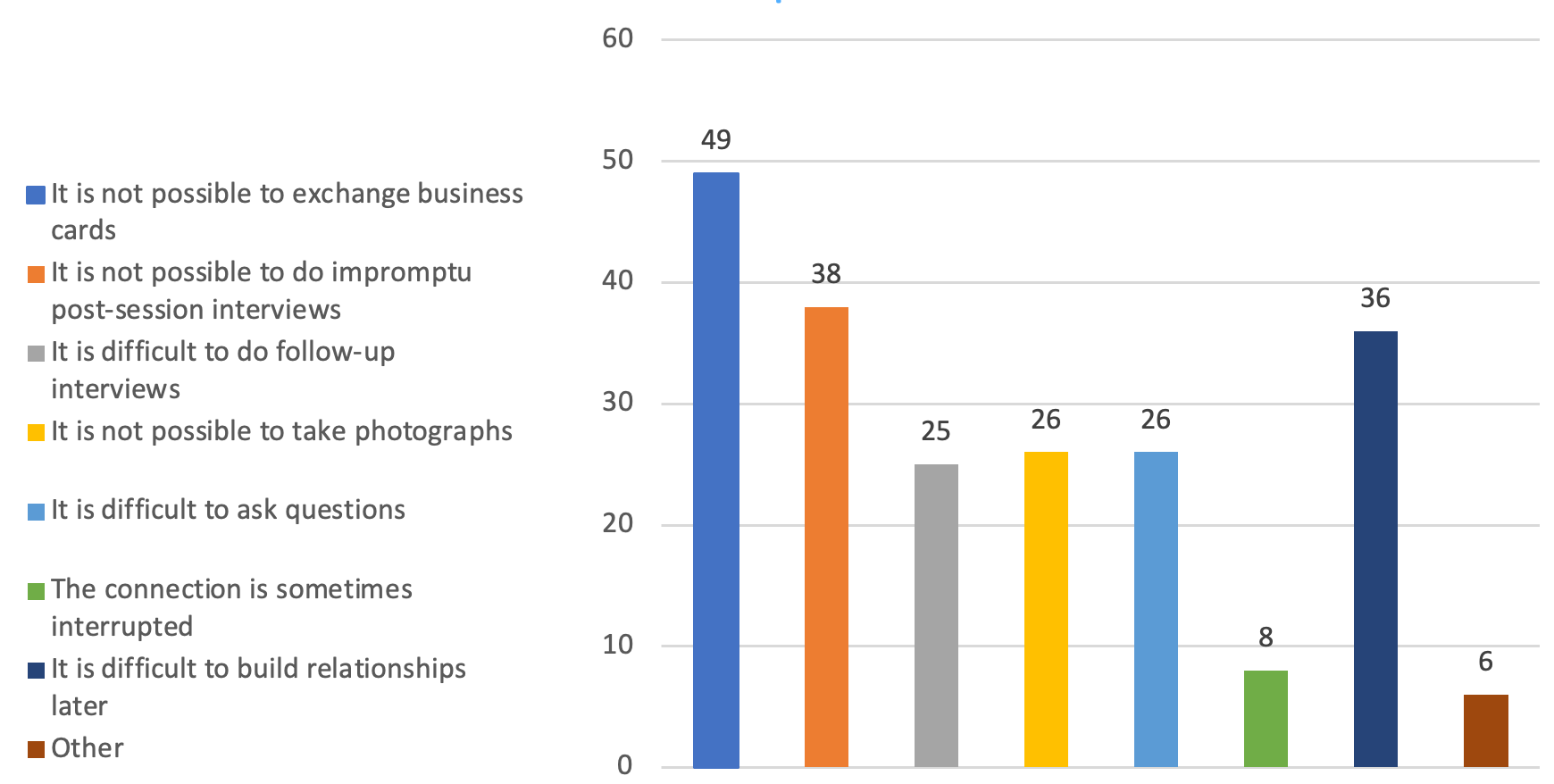
What do you find inconvenient about online seminars?
As the results indicate, journalists openly voiced their experiences regarding the disadvantages of continued online seminars during the pandemic, reaffirming the importance of face-to-face interviews.
When asked if online methods should remain when face-to-face interviews are possible, the percentage of respondents who agreed that “online information should remain an option” rose to 93% from 87% in the previous survey (December 2022). Furthermore, respondents were asked their preference between face-to-face or online reporting, for both interviews and seminars, and to explain their reasoning.
For interviews, 66% of respondents preferred face-to-face, 4% preferred online, and 30% had no preference. For seminars, 34% preferred in-person attendance, 14% preferred online, and 52% were comfortable with either. While the number of respondents who preferred in-person interviews rose significantly from the previous 40%, the proportion of those who preferred either format remained at 30% for interviews (down from 60% previously) and increased to 52% for seminars (up from 42%).
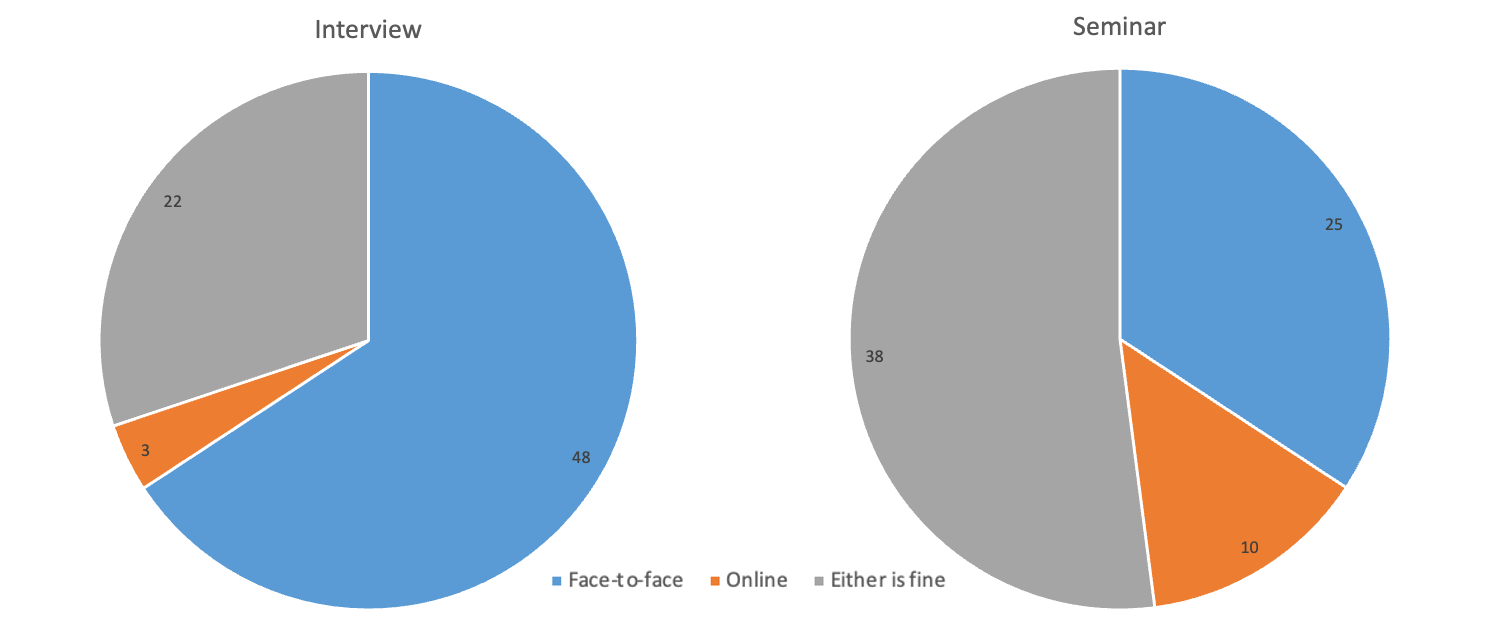
The number of respondents who chose “either face-to-face or online” increased to 52%, up from 42% in the previous survey.
When we asked those who preferred “either” format to explain why, the true intentions of the journalists became clear. Many expressed that both formats have their advantages and disadvantages, and they appreciated being able to choose the format based on content and schedule. This was consistent with the reasoning provided in the previous question about the continuation of online information. It reflects how journalists find it inconvenient if they were limited to one format, with some voicing that they found it odd when seminars were restricted to in-person attendance only since hybrid-format seminars have become the norm for them.
The reasons given for preferring face-to-face interviews included: “I can ask detailed questions,” “It’s easier to ask follow-up questions,” “I can interrupt to probe deeper,” “I can gain a lot of information from informal chats beyond the main topic,” and “I sometimes find hints on how to cover a topic during casual chats while exchanging business cards after a seminar,” “It’s easier to understand how strongly the interviewee feels about a certain topic.” Others noted it was beneficial for building relationships after interviews, with one respondent saying, “I can arrange appointments after impromptu post-session interviews.”
On the other hand, the most common reason for preferring online interviews was the lack of time and location constraints. Other reasons included: “Online seminars are easier to follow in terms of visibility of materials shared on screen and audio,” “I can share materials on screen, making the content easier to understand,” and “The screen recording feature allows me to review the seminar later, which is very helpful.”
2. Media Expectations of Corporate PR and PR Agencies
Speedy and timely PR responses.
For the first time, this survey also asked the media about their expectations of PR staff at pharmaceutical companies and agencies. First, we asked respondents to select what they considered important in terms of information shared by pharmaceutical companies.
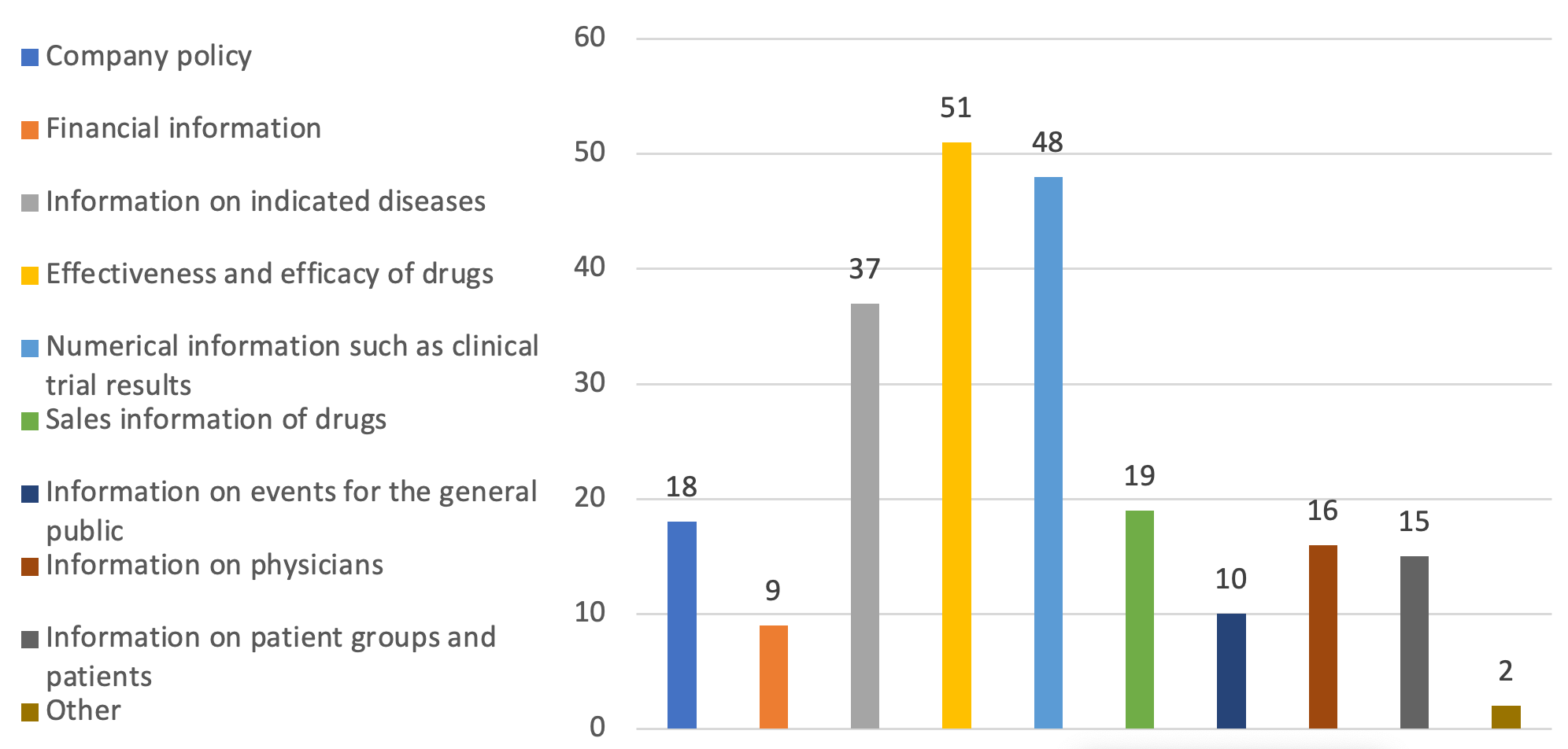
What do you consider to be important information from pharmaceutical companies?
The graph shows that the top three concerns are the effectiveness, reliability, and evidence of the pharmaceutical products. Recent consumer awareness of product safety and security has also grown, and news organizations have shown increased interest in these areas. However, while this graph is beneficial in understanding the overall trend, it is important to note that media interests vary depending on their specific focus. For example, pharmaceutical companies must be creative in providing information to media outlets that are more interested in topics like management and finance, which ranked lower in this survey, or in topics like workstyle, which was not included as a criterion this time.
Next, respondents were asked what they found beneficial in communicating with PR staff from pharmaceutical companies.
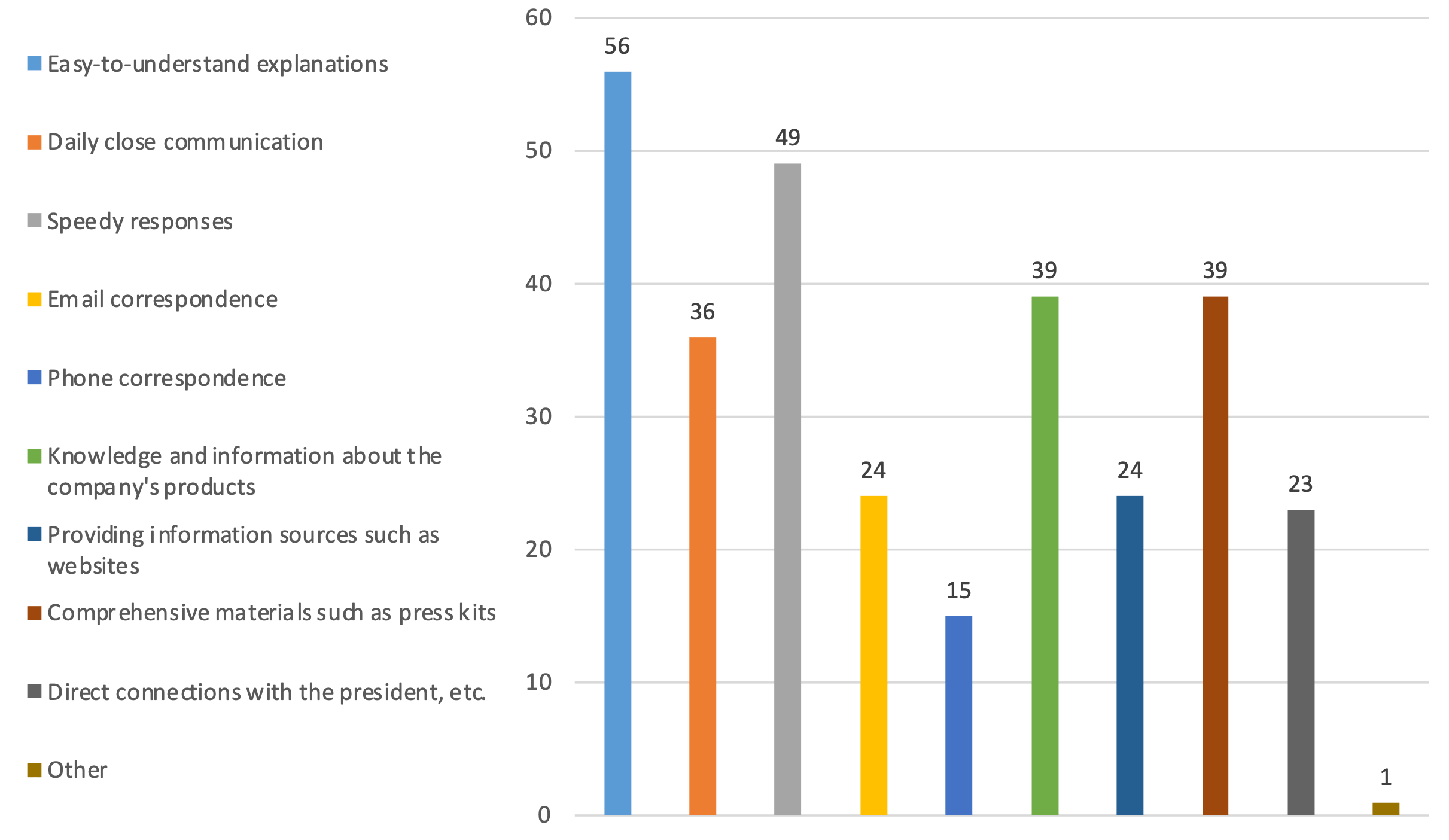
What do you consider beneficial when communicating with pharmaceutical company’s PR staff?
As shown in the graph, the top items included “clear explanations,” “speedy responses,” and “knowledge of the company’s products.” These are all basic aspects of information sharing, so it’s not surprising that they were the most common responses.
A number of media said, “I just want them to pick up the phone!”
When asked in a free-response format what could be improved, many respondents said, “I can’t get anyone to answer the phone,” “I wish the press contact number was more accessible on the web,” and “Email inquiries are slow and inefficient.” Journalists also expressed frustration over email-only responses to press releases, saying, “I wish press releases weren’t limited to email,” “I wish phone inquiries were available on days when press releases are released,” and “It would be helpful to have same-day notifications for missed calls.”
The gap between what is considered useful and the areas needing improvement suggests a misalignment between journalists’ expectations and reality. The emphasis on “speedy responses” reflects journalists’ expectations for quick PR feedback. However, the question remains whether the COVID-19 experience has caused pharmaceutical companies to focus on internal priorities, despite efforts to optimize working from home, operational streamlining, and digitalization, leading to a neglect of basic PR practices or a decline in the overall quality of information services. Reflecting on these survey results can provide insight for corporate PR professionals.
Next, we asked respondents about their expectations of PR agency staff. (5)
Although the response options differed from those for corporate PR staff, the top responses – such as “speedy responses” and “clear explanations” – were similar. However, “support with interviews” and “impartial information, including about competitors,” were also noted, indicating that the media expects PR agencies to play a slightly different role than in-house PR teams.
3. Healthcare Topics of Media Interest
Sensitive to trends in the world and the needs of readers.
Leveraging the power of the media to stimulate public interest.
Finally, respondents were asked to select the healthcare topics they are most focused on. (3)
The graph shows the health care topics of interest in the past year, the health care topics of current interest, and the health care topics that will be of interest in the future, arranged by topic, and the changes over time.
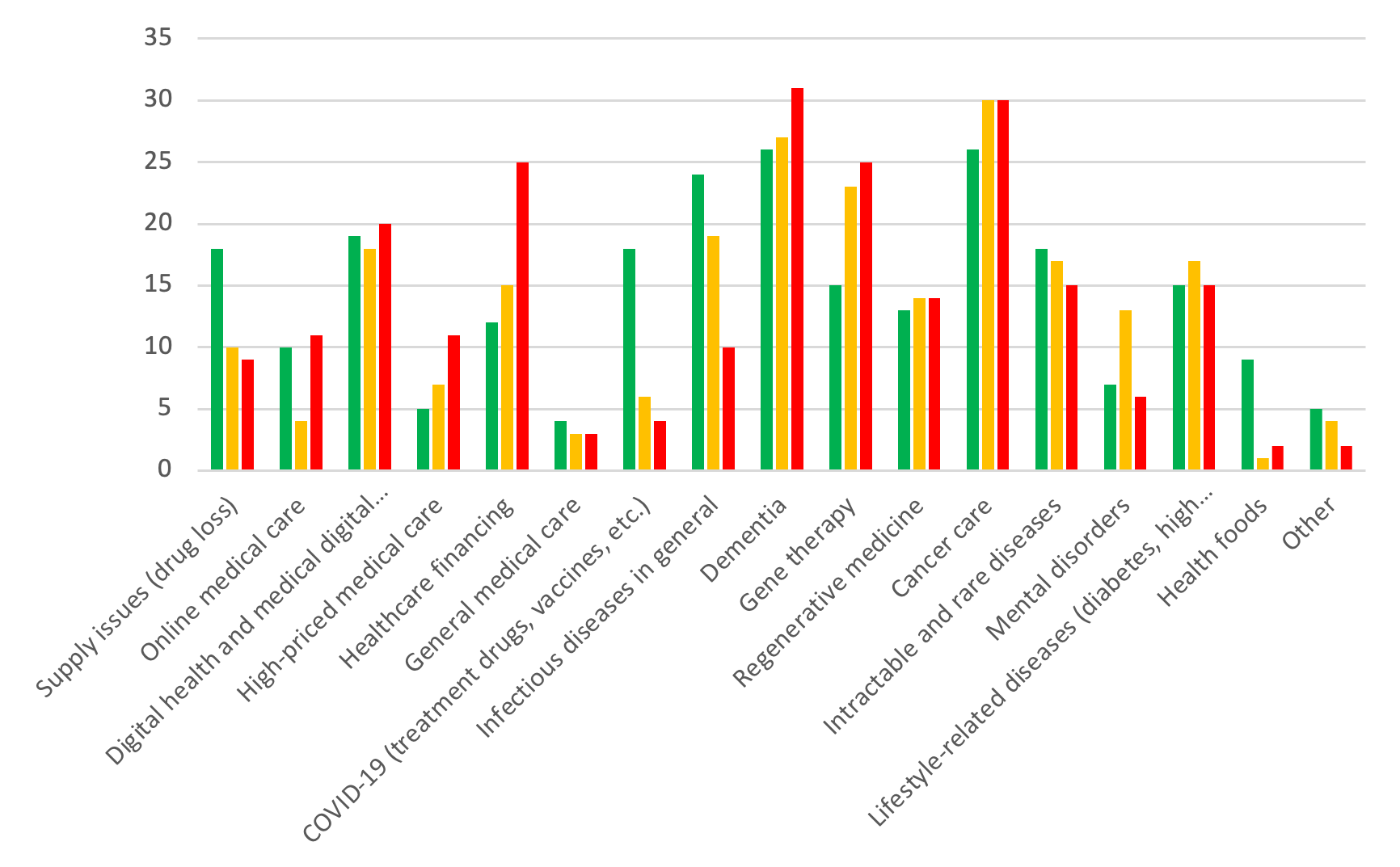
Topics of media interest.
Interest in infectious diseases has declined significantly as the COVID-19 pandemic subsides. Similarly, interest in drug loss is expected to taper off as the issue improves. However, cancer treatment and dementia continue to dominate media attention. Gene therapy and healthcare finance are two emerging topics expected to draw more attention in the future.
Media interest reflects broader societal concerns, and topics that gain media attention can shape public discourse. Therefore, it is essential for companies to continuously monitor media interests, listen to the voices of journalists, and understand the needs in information.
We hope this survey provides useful insights with its focus on how the media and businesses can best work together.
Survey Overview
•Survey Title: Media and Healthcare Companies in a Post-COVID Era
•Survey Date: August 27-29, 2024
•Survey Method: Online
•Target Audience: Healthcare journalists
•Valid Responses: 73 (8 national newspapers, 5 news agencies, 1 industry newspaper, 12 trade publications, 21 healthcare professional media, 5 general magazines, 3 TV, 13 web media, 5 others)
________________________________________
Note: This newsletter is based on an independent survey conducted by COSMO PR. For inquiries, please contact: info_cosmo@cosmopr.co.jp

